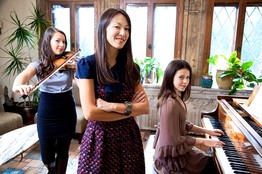Noteworthy Wednesday!
Why Chinese Mothers Are Superior – WSJ.com.
Chinese children will never:
• attend a sleepover
• have a playdate
• be in a school play
• complain about not being in a school play
• watch TV or play computer games
• choose their own extracurricular activities
• get any grade less than an A
• not be the No. 1 student in every subject except gym and drama
• play any instrument other than the piano or violin
• not play the piano or violin.
via Why Chinese Mothers Are Superior – WSJ.com.
Have you ever wondered why Asian children excel in academics and music?
Well, there is an emphasis on academics and the performing arts which is unlike the emphasis on sports and other activities which is often seen in “Western” parenting.
According to the Wall Street Journal article….Chinese parents “understand that nothing is fun until you are good at it”.
In order to be good at something you have to work at it hence you must practice piano if you are to be good at it…you must practice writing if you are to be a good writer. We all know that children rarely like to practice so if this practicing is going to happen the parents must override the child’s desire to do something else.
It seems that if you are not permitted television or computer games nor can you choose your own extracurricular activities and cannot have a play-date or be in a school play then there is not much else to do but study, read and practice the violin and piano which are the chosen instruments in this culture.
Chinese parents according to the WSJ article use shaming if a child is disrespectful by actually calling their child “garbage”. According to the author, she knew what her parents meant and such criticism did not damage her self esteem. She attributes this to the fact that she was always given much praise for her accomplishments for her tenacious practice and her excellent academics. This is what built her confidence. When a child excels in a not so fun activity…it makes the activity fun in the long run. Now the parent has succeeded in getting the child to work even more.
The author goes on to point out three major differences between Chinese and Western parents.
- Western parents are very concerned with their child’s self -esteem and try to reassure their children no matter how they perform. They view their child’s psyche as fragile where Chinese parents do not. Chinese parents will use “shaming” and assume that their child is strong enough to take and thus improve upon their performance.
- Western parents do not believe for the most part that their children owe them anything, whereas the Chinese parents believe their children owe them everything possibly based on Confucian piety.
- Chinese parents believe that they know what is best for their children. This is why they make choices for them. Western parents sometimes feel this way but tend to acknowledge the child’s preferences.
The author makes a final statement which really summarizes it all:
“Western parents try to respect their children’s individuality, encouraging them to pursue their true passions, supporting their choices, and providing positive reinforcement and a nurturing environment. By contrast, the Chinese believe that the best way to protect their children is by preparing them for the future, letting them see what they’re capable of, and arming them with skills, work habits and inner confidence that no one can ever take away.”

